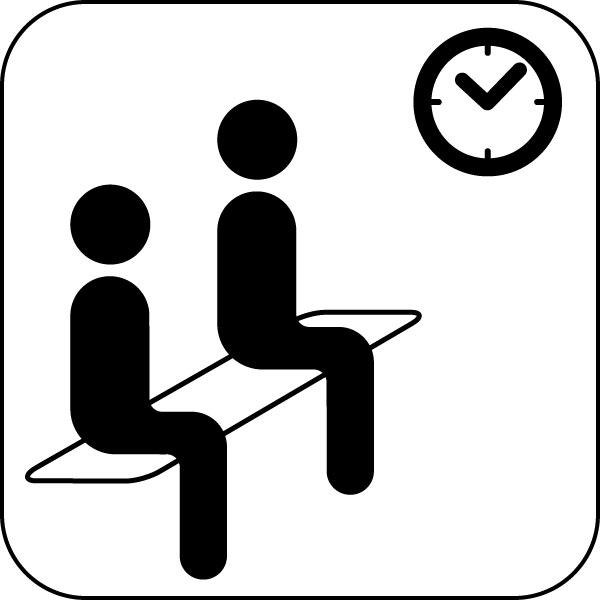January 16, 2013
Top Reasons People Stop Using Public Transit
Nothing ruins a public transportation rider's day quite like waiting around for a train or bus that never shows up. Turns out that if it happens enough, riders will start giving up on transit, according to a new report.
University of California, Berkeley researchers examined exactly what effect a transit system's unreliability has on its customers. While it's well-known that reliability is important to riders, it's less understood how, exactly, common transit problems impact the public's likelihood to reduce their ridership in the long-term.
Some studies show that transit riders value consistent travel times even more than shorter travel times, making reliability an especially important issue for agencies to consider if they want to retain customers.
Researchers came up with a list of various ways transit can be considered "unreliable" -- buses can show up late; mobile apps can offer inaccurate arrival information; subways can be so crowded that it's impossible to find a seat, or even board -- then surveyed public transit riders in the San Francisco area.
One statistic in the study stands out in particular and should give transit agencies pause: More than half of the riders said they had reduced their use of public transportation specifically because of its unreliability. Most of them didn't just make fewer trips overall; rather, they switched to other modes of transportation to fill the void.
That's significant because transit agencies and advocates alike place a heavy emphasis on courting so-called "choice riders" -- those who have other options besides public transportation, but for one reason or another choose it anyway. The lesson from the researchers is that quality of service is important, and if it declines, choice riders don't mind finding alternatives. Unlike commuters who travel by car and have few options when it comes to changing their routes, some transit riders do have flexibility. And that flexibility can work against transit agencies if their services becomes too unreliable.
Frequent, consistent service -- and in particular, reliable transfers between stops -- are what's most important to riders, according to the study. Riders care most about getting picked up from their stop in 10 minutes or less, and they especially value being able to make their scheduled connections. They're not so interested in whether their rides are crowded or whether they can find a seat.
The findings were presented by Andre Carrel, a doctorate student in Berkeley's civil and environmental engineering department. The study's other authors include Anne Halvorsen and Joan Walker. The research was presented at this week's Transportation Research Board annual mega-conference in Washington, D.C.
The study also found that transit riders aren't an unreasonable bunch. Negative experiences that involved issues that are beyond a transit agency's direct control, like delays due to emergencies and traffic, only had a minimal impact on passengers' choice to scale back their transit usage.
But a few key things in particular irk passengers: delays that occur once they board a vehicle and delays when they're trying to make a transfer. Delays at transfer stops were more than twice as likely to make someone reduce their transit use than a delay at the point of origin. Riders were especially turned off by delays due to operational problems like backups in the system.
The study also found that people who own smartphones and have access to real-time arrival information are less likely to use public transit. The reason for this is unclear, but it could be that access to real-time information makes travelers more aware of delays.
At a time when transit agencies continue to take budgetary hurdles, the insights from the study are worth considering. Since certain failings have much larger impacts on ridership than others, it may be in public transportation agencies' best interest to focus resources on minimizing those inconveniences in particular.
For example, it appears passengers prefer higher frequency stops with small vehicles than lower frequencies with large vehicles -- even at the cost of overcrowding.
The research might be useful in guiding some operational decisions at agencies. In-vehicle delays are more likely to drive people away than delays at stops. So during disruptions, researchers propose cancelling trips in advance as opposed to holding full vehicles closer to the spot causing disruptions. That might seem counterintuitive -- but not if the goal is to retain customers.
And if a delay is due to factors beyond an agency's control, the report recommends that agencies have operators communicate that information to riders. It might also make sense to have a system in place to specifically provide guaranteed connections at transfer stations during times of infrequent service, since passengers are especially bothered by their inability to make connections.
Transit ridership is slowly increasing, but budgetary pressures are causing headaches for transit agencies nationwide as they continue to struggle with service cuts. Leaders that use their limited resources to tailor their efforts toward the passenger experience may find it's an effective strategy for keeping their ridership momentum going, even during lean times.
Note:
The paper which was presented at this week's Transportation Research Board meeting is titled, "Passengers' Perception of and Behavioral Adaptation to Unreliability in Public Transportation" and its authors are Carrel, Andre; Halvorsen, Anne; Walker, Joan L. all from the University of California at Berkeley. The paper number is 13-5289 and for those who did not attend the conference, the paper can be purchased for $20 at http://amonline.trb.org/


Citizens Taking Action
for advancement of public transit
and passenger trains
"One statistic in the study stands out in particular and should give transit agencies pause: More than half of the riders said they had reduced their use of public transportation specifically because of its unreliability."

